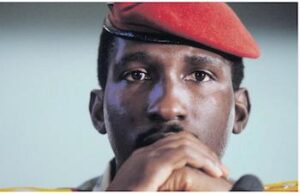
Thomas Sankara
*Thomas Sankara was born on this date in 1949. He was a Black African military officer, Marxist revolutionary, and Pan-Africanist.
Thomas Isidore Noël Sankara was born in Yako, French Upper Volta, Burkina Faso, the third of ten children to Joseph and Marguerite Sankara. His father, a gendarme, was Mossi–Fulani, while his mother, Marguerite Kinda, was of direct Mossi Descent. He spent his early years in Gaoua. As the son of one of the few African functionaries then employed by the colonial state, he enjoyed a relatively privileged position.
Sankara attended primary school at Bobo-Dioulasso. He applied himself seriously to his schoolwork and excelled in mathematics and French. He attended church and was impressed with his energy and eagerness to learn. Some priests encouraged Thomas to attend seminary school once he finished primary school. Despite initially agreeing, he passed the exam required for entry to the sixth grade in the secular educational system. His parents wanted him to become a priest, but he chose to enter the military, which came with a scholarship; Sankara took the entrance exam and passed.
At 17, he joined the military academy of Kadiogo in Ouagadougou. While there, he witnessed the first army coup d'état in Upper Volta. This was Sankara's first systematically exposed to a revolutionary perspective on Upper Volta and the world. Aside from his academic and extracurricular political activities, Sankara played the guitar.
In 1970, 20-year-old Sankara went on for further military studies at the military academy of Antsirabe in Madagascar, from which he graduated as a junior officer in 1973. During that period, he read extensively about history and the army strategy, thus acquiring the concepts and analytical tools he would later use in his reinterpretation of Burkinabe political history. After he was appointed prime minister in 1983, disputes with the sitting Government led to his eventual imprisonment. While under house arrest, a group of revolutionaries seized power on his behalf in a popularly supported coup later that year.
At age 33, Sankara became the President of the Republic of Upper Volta and launched social, ecological, and economic programs and renamed the country Burkina Faso ('Land of Incorruptible People'), with its people being called Burkinabé ('upright people'). His foreign policies were anti-imperialism, and he rejected aid from organizations like the International Monetary Fund. Sankara welcomed foreign aid from other sources but tried to reduce reliance on aid by boosting domestic revenues and diversifying the sources of assistance.
His domestic policies included famine prevention, agricultural self-sufficiency, land reform, and suspending rural poll taxes, as well as a nationwide literacy campaign and vaccination program against meningitis, yellow fever, and measles. His Government also focused on building schools, health centers, water reservoirs, and infrastructure projects. He combated the desertification of the Sahel by planting over 10 million trees. He outlawed female genital mutilation, forced marriages, and polygamy.
He set up Popular Revolutionary Tribunals to prosecute public officials charged with political crimes and corruption, considering such elements of the state counterrevolutionaries. This policy led to criticism by Amnesty International for human rights violations, including extrajudicial executions and arbitrary detentions of political opponents. His programs for African self-reliance made him an icon to many of Africa's poverty-stricken nations, and Sankara remained popular with a considerable majority of his country's citizens.
However, some of his policies alienated elements of the former ruling class, including the tribal leaders, the governments of France, and its ally, the Ivory Coast. On October 15, 1987, Thomas Sankara was assassinated by troops led by Blaise Compaoré, who assumed leadership of the state shortly after that and retained it until the 2014 Burkina Faso uprising.